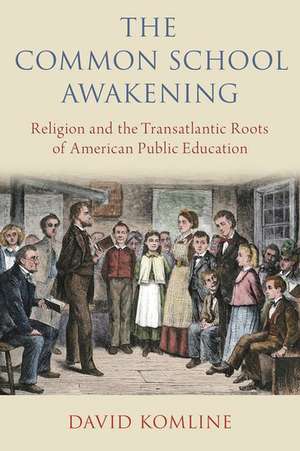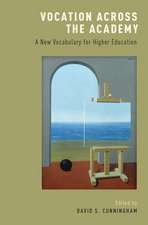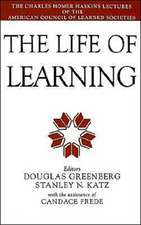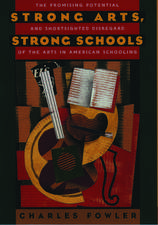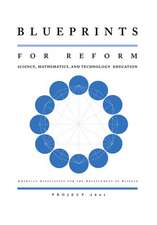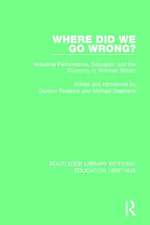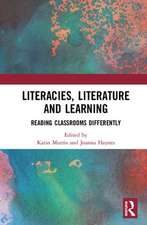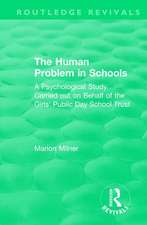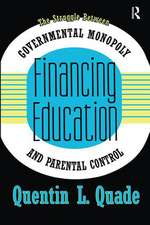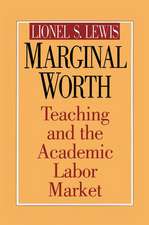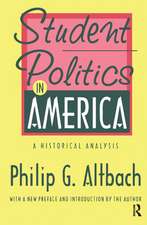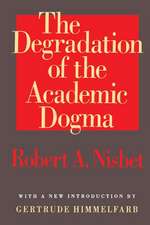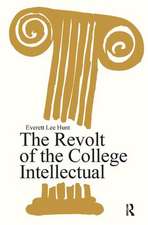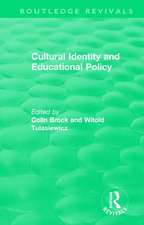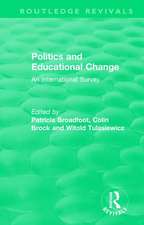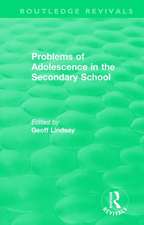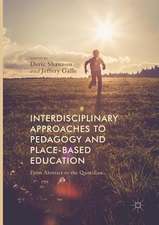The Common School Awakening: Religion and the Transatlantic Roots of American Public Education
Autor David Komlineen Limba Engleză Hardback – 16 oct 2020
Preț: 582.12 lei
Preț vechi: 833.85 lei
-30% Nou
Puncte Express: 873
Preț estimativ în valută:
111.39€ • 116.07$ • 92.23£
111.39€ • 116.07$ • 92.23£
Carte tipărită la comandă
Livrare economică 24-29 martie
Preluare comenzi: 021 569.72.76
Specificații
ISBN-13: 9780190085155
ISBN-10: 0190085150
Pagini: 312
Dimensiuni: 236 x 155 x 28 mm
Greutate: 0.59 kg
Editura: Oxford University Press
Colecția OUP USA
Locul publicării:New York, United States
ISBN-10: 0190085150
Pagini: 312
Dimensiuni: 236 x 155 x 28 mm
Greutate: 0.59 kg
Editura: Oxford University Press
Colecția OUP USA
Locul publicării:New York, United States
Recenzii
Komline's meticulous account will be of interest to scholars of education, religion, and reform. Moreover, its simultaneously sympathetic and analytical approach to reformers' good intentions, mixed achievements, and unintended results -- along with its graceful narrative -- makes it a quiet pleasure to read.
The Common School Awakening is an extremely valuable book and I recommend it highly to readers of Church History or any historian of religion or of education, especially those interested in the Second Great Awakening and the Common School Revival and the interplay between the two.
Though often a component of any understanding of American education, half-truths too often dominate explanations of the common school's birth in the US. In The Common School Awakening, Komline (Western Theological Seminary) sets the record straight on several key misperceptions. ... [H]e provides a critical component to any accurate understanding of the development of the common school specifically, American education generally, and the nation that both helped mold.
Komline's study brings attention to the under-explored religious dimension of the rise of American public education, and provides much-needed insight into the origins some of the perennial tensions of public education in a pluralistic society.
Contemporary discussions of American public schools often involve two dimensions: first, how much better schools are in other parts of the world; second, the divisive intersection of religion and education. David Komline's new book is an essential guide to understanding the roots of those debates, significantly deepening our understanding of the development of the American public-school system in the first part of the nineteenth century
The arrival of The Common School Awakening will give historians, education theorists, and policy scholars much to reconsider. Generally considered to have begun in the 1830s in Massachusetts, Komline shows that the common school movement actually had its origins across the Atlantic and at least a generation earlier, before the turn of the nineteenth century. Quite frankly, I am persuaded by the case he makes-and it will change the way I think and write about the rise of common schools in America. Given that debates over public schools in American have in many ways been debates over the nature of democracy and all that it entails, this is no small accomplishment.
The Common School Awakening is an extremely valuable book and I recommend it highly to readers of Church History or any historian of religion or of education, especially those interested in the Second Great Awakening and the Common School Revival and the interplay between the two.
Though often a component of any understanding of American education, half-truths too often dominate explanations of the common school's birth in the US. In The Common School Awakening, Komline (Western Theological Seminary) sets the record straight on several key misperceptions. ... [H]e provides a critical component to any accurate understanding of the development of the common school specifically, American education generally, and the nation that both helped mold.
Komline's study brings attention to the under-explored religious dimension of the rise of American public education, and provides much-needed insight into the origins some of the perennial tensions of public education in a pluralistic society.
Contemporary discussions of American public schools often involve two dimensions: first, how much better schools are in other parts of the world; second, the divisive intersection of religion and education. David Komline's new book is an essential guide to understanding the roots of those debates, significantly deepening our understanding of the development of the American public-school system in the first part of the nineteenth century
The arrival of The Common School Awakening will give historians, education theorists, and policy scholars much to reconsider. Generally considered to have begun in the 1830s in Massachusetts, Komline shows that the common school movement actually had its origins across the Atlantic and at least a generation earlier, before the turn of the nineteenth century. Quite frankly, I am persuaded by the case he makes-and it will change the way I think and write about the rise of common schools in America. Given that debates over public schools in American have in many ways been debates over the nature of democracy and all that it entails, this is no small accomplishment.
Notă biografică
David Komline is Associate Professor of Church History at Western Theological Seminary in Holland, Michigan. He holds a PhD from the University of Notre Dame and spent a year as a Fulbright Fellow at the University of Heidelberg. He has published essays in Religion and American Culture, Anglican and Episcopal History, and several edited collections.
